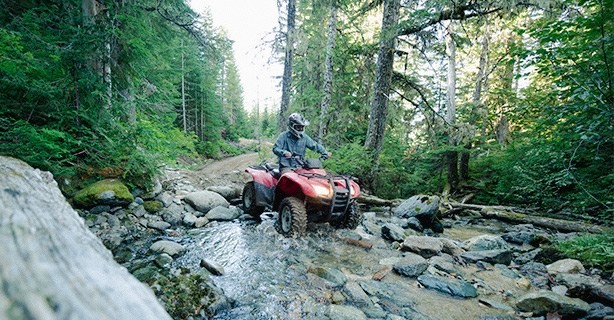ATV vs. UTV: The differences explained
0 min. read
What’s the difference between an ATV vs. a UTV?
ATV stands for “all-terrain vehicle.” Typically, an ATV is used for recreation. Designed for single riders, the most common ATVs are four-wheelers/quads. A UTV is a “utility task vehicle.” Designed with a cabin for two to four riders, a UTV is used for work or recreation. Alternative UTV names are SxS and side-by-side.
Shopping for and purchasing an off-road vehicle can be an exciting adventure all on its own—especially when you're deciding between an all-terrain vehicle (ATV) or a utility task vehicle (UTV). Review and compare their features below to determine which of these vehicles may be best for you.
Definition of an ATV
An ATV is an all-terrain vehicle—commonly called a four-wheeler or quad—designed for a single rider and typically used for recreation.
ATV characteristics
Seating capacity: ATVs are meant for single riders.
Steering: Operators use handlebars to steer and a thumb or twist throttle to accelerate and decelerate.
Wheels: ATVs have four wheels. Sales of three-wheeled ATVs have been banned in the U.S. since 1988.
Cabin: Four-wheelers are most commonly open-topped vehicles, but cab enclosures are available.
Speed: ATVs can reach a maximum speed of 85 mph.
ATV safety features
Every off-road vehicle comes with safety risks. Since ATVs don't come with attached safety features, we recommend wearing additional safety gear—such as a helmet, protective footwear, and clothing—to help keep you safe.
Uses for an ATV
An ATV is intended for recreational riding, and like its name suggests, can handle all terrains. So, getting from one place to another over rough ground is its specialty.
ATV pros and cons
Depending on the year, make, and model, you can expect to spend anywhere from $1,000 to more than $25,000 on your new ride. The cost of ATVs may be a pro for you since they're typically less expensive than a UTV. In addition, ATVs are easy to operate, especially if you've driven a motorcycle or snowmobile. Since an ATV is open-topped and typically smaller than a UTV, you can just hop on and hit the trail—even rough ones. The smaller size may be a con for you if you like to ride with passengers. You can still enjoy group trail rides, but keep in mind, your ATV is designed for one rider at a time.
Definition of a UTV
A UTV is a utility task vehicle used for work or recreation. Designed with a cabin for two to four riders, it's often called an SxS or side-by-side.
UTV characteristics
Seating capacity: UTVs usually have space for more than one rider—typically up to four people.
Steering: Driving a UTV is like driving a car—it has a steering wheel and foot pedals to accelerate and decelerate.
Wheels: UTVs have four wheels, but some models have more wheels for specialized purposes.
Cabin: UTVs are equipped with a cabin or bars for added protection.
Speed: Depending on the model, a UTV can reach a maximum speed of 85 mph; however, a UTV is generally slower than an ATV.
UTV safety features
A UTV is built with seat belts and a cabin or bars that surround you and your passengers to help protect you in the event of a rollover. Although UTVs come with safety features, we recommend helmets and other protective gear for additional protection.
Uses for a UTV
A UTV has added storage space, making it a great tool to haul and transport materials. Considering UTVs have space for more than one rider, they're also an option for recreational riding when you want to share your love of off-roading with family and friends.
UTV pros and cons
You may find UTVs have several pros for you—room for more riders, more options for customization, and more included safety features, such as seat belts, a windshield, and a roll cage. These additional features mean UTVs typically have a higher price tag than ATVs, which may be a con for you. On the plus side, you can enjoy rides with your buddies by your side, and have a convenient work vehicle to haul materials or roam your property.
Which one is best for you?
Whether you're mud boggin' or hitting granny trails, your off-road adventures will be memorable on either an ATV or UTV. Ultimately, the decision on which type of off-road vehicle to buy comes down to you, your comfort level in operating it, and your primary plans to use it.
Enjoy the ride!
Related links
Here's a closer look at off-road insurance coverages to consider when adventuring on your ATV or UTV.
Perhaps you're considering two-wheeled, off-road riding. Dairyland offers dirt bike insurance as well.
The general information in this blog is for informational or entertainment purposes only. View our blog disclaimer.
*Data accuracy is subject to this article's publication date.







